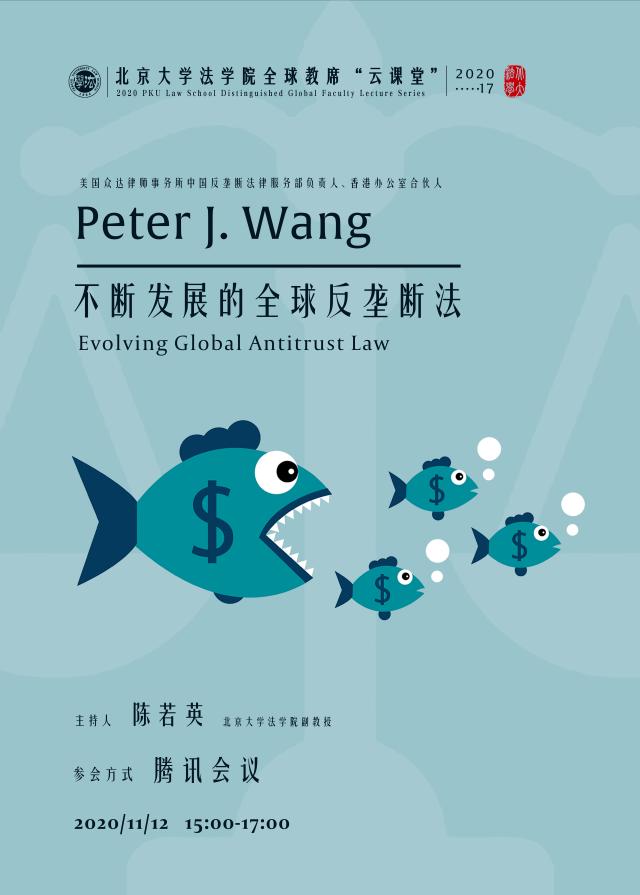全球教席“云课堂”17 讲
题目:不断发展的全球反垄断法 Evolving Global Antitrust Law
时间:2020 年 11 月 12 日(周四)15:00-17:00
腾讯会议 ID:976 859 575
开讲学者:
Peter J. Wang(王智平)(美国众达律师事务所中国反垄断法律服务部负责人、香港办公室合伙人)
主持人:
陈若英(求一个安全的网赌网站(中国)有限公司副教授)
开讲学者简介:
王智平律师曾任众达大中华区主管合伙人和国际诉讼与仲裁业务部的联席负责人。王律师曾多次代表客户应对美国及其它政府对拟进行的并购交易发起的重大反垄断调查,也曾处理非并购类型的反垄断调查和反垄断诉讼事项。同时,王律师代表中国及全球各地的客户处理各类复杂的商业争议诉讼、专利和其它技术和知识产权诉讼。王律师经常参与反海外腐败法(FCPA)的调查及其它类型的公司内部调查,并向客户提供合规及尽职调查事宜的相关建议。王律师于 1991 年加入众达,2003 年加入中国办公室前一直在众达华盛顿办公室从事诉讼和反垄断工作。
Peter J. Wang leads Jones Day’s China antitrust and litigation practices and serves as Partner of Hong Kong Office. He previously served as Partner-in-Charge for the China Region and co-head of the Firm’s International Litigation and Arbitration Practice. Peter has handled major U.S. and other government antitrust investigations of proposed mergers and acquisitions, as well as non-merger investigations and antitrust litigation. He also represents clients from China and around the world in complex commercial disputes and patent and other technology and intellectual property litigation. He regularly handles Foreign Corrupt Practices Act (FCPA) and other corporate internal investigations and advises clients on related compliance and due diligence issues. Peter joined Jones Day in 1991 and practiced litigation and antitrust in the Firm’s Washington, D.C. office before moving to China in 2003.
讲座摘要:
近年来,反垄断法(也被称为“竞争法”或“反托拉斯法”)及其法律实践在世界范围内获得了越来越多的甚至超出法律圈内部的关注——反垄断法及其法律实践具有的政治乃至文化层面上的重要性水平达到了一个多世纪以来的新高峰。
在美国和欧洲,反垄断法面临巨大的压力,批评者认为执法者和法院未能尽力阻止具有市场垄断地位的公司,尤其是那些美国主流科技平台公司持续积累和滥用他们的市场权力。在其他地区,反垄断法一直在迅速发展,世界各地的政府和执法官员都制定了自己的竞争法律和规则,并正在学习如何利用这些工具来追求包括鼓励竞争在内的各种目标。
本讲座将回顾反垄断法的演变,从起源于美国,到“芝加哥学派”的兴起,再到欧洲竞争法的发展,以及它在很大程度上仿效欧洲模式向其他国家传播的过程。我们将讨论涉及全球商业的反垄断事务如何受到多个司法管辖区的反垄断法执法者之间的相互作用和方法差异的影响。
我们将讨论对反垄断的许多批评和挑战,特别是目前在美国和欧洲存在的情况,包括反垄断措施如何违反法治原则。我们还将审视进一步修改反垄断法的各种建议——包括将其范围扩大到保障效率和消费者福利之外的运动;拆分主要互联网平台和其他“守门人”(信息传递者)的主张;转向更广泛的反垄断事前监管措施。
最后,我们将思考被广泛讨论的使反垄断法跨全球司法管辖区“趋同”的目标,以及反垄断法当下的发展是否与该目标一致或将实现该目标。
In recent years, antitrust (also known as “competition” or “antimonopoly”) law and enforcement have gained heightened visibility around the world, even outside legal circles—reaching a level of political and even cultural significance that antitrust has not occupied for more than a century.
In the U.S. and Europe, antitrust is under pressure from critics who believe that enforcers and courts have not done enough to prevent dominant firms—most visibly, the major American technology platforms—from continuing to accumulate and abuse their market power. Elsewhere, antitrust has been growing rapidly, as governments and enforcement officials around the world have enacted their own competition laws and rules, and now are learning how to utilize those tools in pursuit of a variety of pro-competition and other ends.
This lecture will trace the evolution of antitrust law, from its beginnings in the United States, through the rise of the “Chicago school” and beyond; its elaboration into competition law in Europe; and its spread, largely following European models, to the rest of the world. We will discuss how antitrust matters involving global businesses are affected by interplay and differences of approach among antitrust enforcers in multiple jurisdictions.
We will address some of the many criticisms of and challenges to antitrust, particularly as it currently exists in the U.S. and Europe, including, how antitrust measures up against rule of law principles. We also will consider various proposals for further changes to antitrust law—including the movement to expand its reach beyond efficiency and consumer welfare; arguments for break-ups of major internet platforms and other “gatekeepers;” and going beyond antitrust enforcement to broader, ex ante regulation.
Finally, we will consider the widely discussed goal of antitrust “convergence” across global jurisdictions, and whether antitrust’s ongoing evolution is likely to be consistent with or to achieve that goal.

对外事务办公室
2020年11月5日
